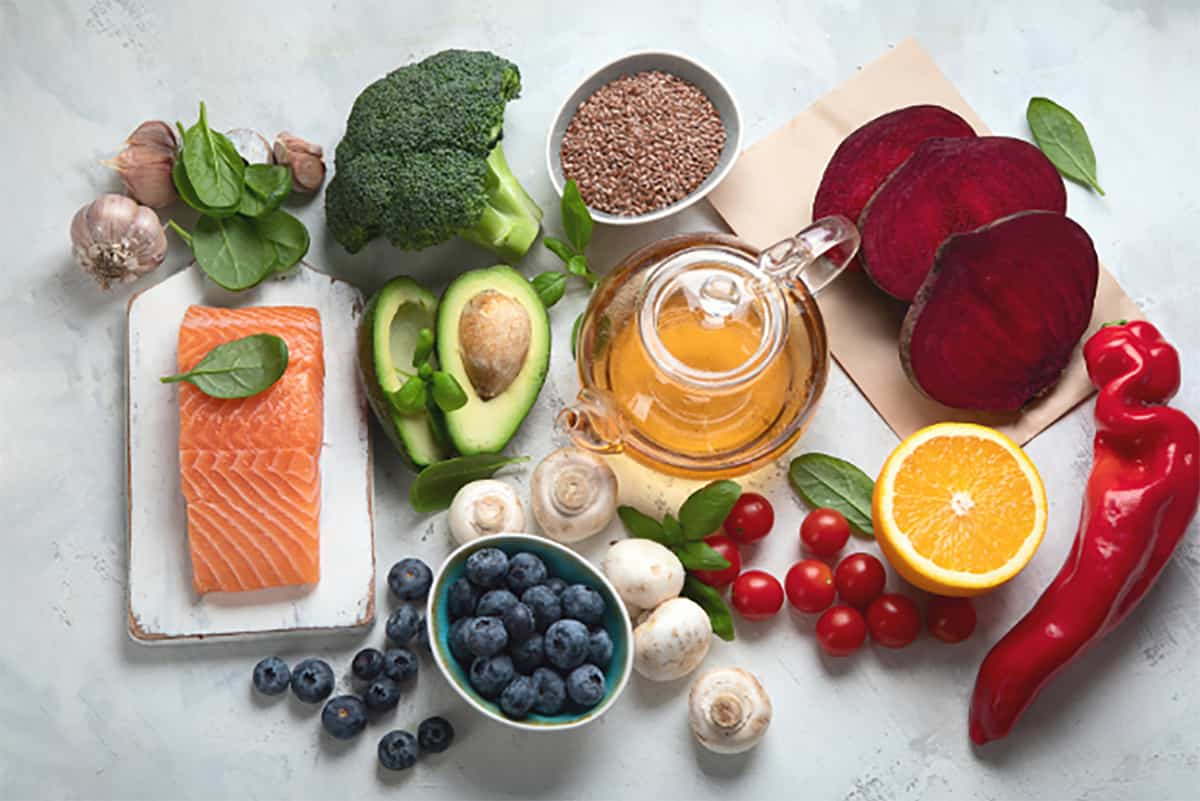Top Anti-Inflammatory Foods To Eat During Menopause

While hormone therapy and other medications may be helpful for the symptoms of menopause-related inflammation, simple changes to your diet can make a big difference.
Estrogen acts as an anti-inflammatory agent in the body. When estrogen begins to decline in perimenopause, inflammation increases. Along with inflammation comes a higher risk of cardiovascular disease, diabetes, and cognitive decline, to name a few. These risks become even more pronounced during postmenopause.
Evidence on the connection between diet and inflammation is growing. It’s now clear that lifestyle changes can improve your health and decrease or even reverse chronic conditions caused by inflammation. Read on to learn how to keep inflammation in check through the food you eat.
The Food-Inflammation Connection
Research shows that diets high in refined carbohydrates, sugar, saturated and trans-fat—but low in fruits, vegetables, omega-3 fatty acids, and whole grains—tend to increase inflammation.
On the other hand, a significant body of research shows that women who follow a healthy diet during the menopause life stage have found relief from inflammation. The Mediterranean diet, in particular, appears to reduce the risk of inflammation-related conditions as effectively as pharmacological interventions.
Even shifting your protein sources can help. One study concluded that menopausal women benefitted from decreased consumption of poultry and dairy products and increased consumption of vegetables and soy.
Fermented foods can decrease inflammation by improving the health of your gut microbiome (healthy bacteria). You can read more about how to cultivate your gut microbiome in the article on probiotics linked below.
Ultimately, what you eat may be the most easily modifiable factor in your life that can lead to reducing inflammation and its consequences.
Inflammatory Foods To Avoid
First and foremost, avoid these inflammation-promoting foods:
- Added sugar. Excess added sugar can cause changes to your blood sugar that in turn release pro-inflammatory signals.
- Saturated fat and trans-fat. Research has shown that midlife women who consume more trans-fat have higher rates of inflammation, while those that eat more fruits, vegetables, whole grains and omega-3 fats have less inflammation. Examples of foods to avoid include:
- Baked goods like cakes, cookies, and pies
- Microwave popcorn
- Frozen pizza
- Fried foods such as French fries, donuts, and fried chicken
- Margarine
- Refined carbohydrates. Refined carbohydrates have been stripped of fiber and other nutrients that are vital in reducing inflammation. Try to limit your intake of:
- Bread and tortillas made with white flour
- Bagels
- Waffles and pastries
- Breakfast cereals and granola
- White rice
- Pizza
- Flavored yogurt
- Cakes and cookies
- Sodas, fruit juices, and smoothies
- Pasta sauce
- Condiments like ketchup and barbeque sauce
- Alcohol. Excess alcohol consumption can cause inflammation in your gut. Limit yourself to one standard drink or less per day.
- Red and processed meats. Women who ate more red and processed meat had higher levels of inflammation.
Top Anti-Inflammatory Foods
Focus on incorporating these anti-inflammatory foods and nutrients:
- Fruits and vegetables. Get the fiber, antioxidants, and other vitamins and minerals needed to fight inflammation. Topping the list of anti-inflammatory fruits and veggies are:
- Tomatoes
- Leafy greens like spinach and kale
- Broccoli
- Beets
- Berries
- Oranges
- Avocados
- Whole grains. Their high fiber content has been found to reduce inflammatory markers in the blood. Try swapping out refined carbs for these choices:
- Oatmeal
- Brown and wild rice
- Quinoa
- Millet
- Omega-3 fatty acids. These healthy fats slow the production of inflammatory compounds. Find the highest levels of omega-3s in these fish (or vegetarian supplements if you don’t eat fish):
- Salmon
- Sardines
- Herring
- Mackerel
- Anchovies
- Legumes. Their high levels of fiber and magnesium are known to reduce inflammation. Instead of potatoes, pasta, and white rice, give these legumes a try:
- Chickpeas
- Lentils
- Black, red, and pinto beans
- Soy (tofu and edamame)
- Nuts and seeds. They can be sprinkled on salads and oatmeal or eaten alone as a snack.
- Nuts: Almonds, cashews, chestnuts, hazelnuts, pine nuts, pistachios, and walnuts
- Seeds: Pumpkin seeds, sunflower seeds, and sesame seeds
- Dark chocolate. Chocolate with 70% or higher cocoa content contains flavanol, a powerful antioxidant that can fight off pro-inflammatory compounds.
- Spices. Turmeric and ginger and flavor and an anti-inflammatory boost to your foods. Ginger is lovely in stir-fries and turmeric gives roasted vegetables a nice kick.
- Green and black teas. While both are beneficial, green tea has been found in studies to be more anti-inflammatory than black tea, plausibly due to the higher flavonoid contents of green tea.
- Oils. Swap out your regular cooking oil for olive oil, a healthier anti-inflammatory option. Avocado oil is a good choice for high-heat cooking.
Sign up for more unique women’s health content
By submitting this form, you agree to the Lisa Health Privacy Policy and Terms of Use


